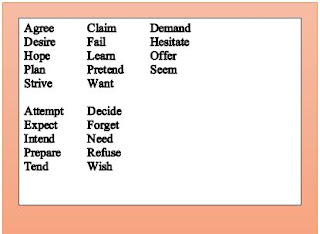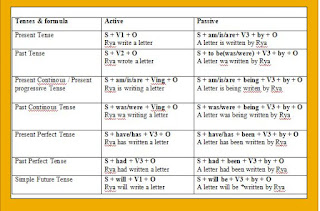VERBS AS COMPLEMENTS, AFFIRMATIVE AND NEGATIVE AGREEMENT
BELAJAR
YUK! TENTANG VERBS AS COMPLEMENTS, AFFIRMATIVE AND NEGATIVE AGREEMENT
Hallo semuanya !
Pada postingan kali ini,
saya akan berusaha untuk menjelaskan beberapa materi mengenai verbs as
complements, Affirmative agreement dan Negative agreement. Oke langsung check
it out!
VERBS AS COMPLEMENTS
VERBS AS COMPLEMENTS
Verb complement adalah sebuah kata atau kelompok kata yang berfungsi sebagai objek (bisa berupadirect object atau indirect object) dari verb dan melengkapi arti verb tersebut.
Beberapa kata kerja dapat mengambil kata kerja lain sebagai pelengkap dan bukannya kata benda. Terkadang kata kerja yang berfungsi sebagai pelengkap harus dalam infinitif ( to + verb) dan kadang-kadang harus dalam bentuk gerund (verb + ing). kata kerja berikut selalu diikuti oleh infinitif jika komplemennya adalah kata kerja
verbs
that are always followed by the infinitive
Bentuk infinitive dari kata kerja adalah kata kerja itu
sendiri yang masih dalam bentuk dasar(base). Kata kerja yang dimaksud disini
adalah kata kerja yang biasa digunakan pada kamus-kamus bahasa Inggris.
Rumus
infinitive :
S + to
+ verb = infinitive
Berikut
adalah kata kerja yang selalu menjadi infinitive
contoh
kalimat :
she agreed
to cook lunch for us
naufal expects
to begin studying pschychology next semester
She wanted
to go
i decided
to refuse the offer
verbs
that are always followed by the gerund
Gerund adalah kata benda yang dibentuk dari V-ing atau kata
kerja diubah menjadi kata benda dengan menambah akhiran-ing
Rumus
Gerund
S +
verb + ing
Dibawah
ini adalah beberapa kata kerja yang selalu menjadi gerund
contoh
Kalimat :
I enjoy studying chemistry with Mr.nataradja
I considered reading newspaper tonight
Dan dibawah ini juga terdapat beberapa kata kerja yang yang
bisa menjadi gerund ataupun infinitive tanpa mengubah arti kalimat.
Contoh kalimat :
He started to study after
dinner OR He started studying after dinner
Panji hates to ride his
bicycle to school OR Panji hates riding his bicycle to school
verbs + Prepositions
folllowed by the gerund
jika kata kerja + kata
depan, kata sifat + kata depan, kata benda + kata depan, atau kata depan it
sendiri diikuti oleh kata kerja, maka kata kerjaa selalu diikuti oleh susunan
gerund. berikut adalah beberapa kata yang terdiri dari kata kerja dan kata
depan
beberapa ekspresi berikut ini mengandung kata depan to namun
kata depan to itu berbeda dengan infinitive. berikut
adalah ekspresi verb+prpepositions yang harus diikuti oleh gerund.
contoh kalimat:
anjas gave up smoking
because of his doctor's advice
we are not looking forward
to going back to school
you would be better off
leaving now instead of tomorrow
Adjective
+ prepositions followed by the gerund
beberapa
kata kerja + kata depan dibawah ini diikuti oleh gerund
contoh
kalimat :
Tengku
is afraid of getting married now
Jean is
not capable of understanding the predicament
ryan is
fond of dancing
Nouns+
prepositions followed by the gerund
kata
benda + kata depan juga diikuti oleh gerund
contoh
kalimat :
ermin
has no excuse for dropping out of school
there
is no reason for leaving this early
lita
has developed a method for evaluating this problem.
kapanpun
kata depan diikuti oleh kata kerja, kata kerja tersebut menjadi bentuk gerund.
contoh
:
after
leaving the party, Ali drove home.
He
should have stayed in the nwe york, instead of moving to maine.
adjectives
followed by the infinitive
kata
kerja yang selalu diikuti oleh kata kerja bentuk infinitive dan tidak pernah
dari bentuk gerund.
arti
dari kata able sama dengan capable disegala
hal, tetapi didalam grammer itu sangat berbeda artinya. jika able diikuti
oleh infinitive, capable diikuti oleh of+[verb+ing].
contoh
kalimat:
these
students are not yet able to handle such difficult problems.
these
students are not yet capable of handling such difficult
problems.
contoh
dari kalimat adj follwed by infinitive:
uli is
eager to see her family
it is
dangerous to drive in this weather
we are
ready to leave now.
beberapa
kata kerja diikuti entah dari infinitive atau dari gerund, tetapi memiliki arti
yang berubah.
contoh
:
jims
stopped studying [ john is not going to study anymore]
jims
stopped to study [ john stopped doing something in order to study]
pronouns
before the gerund or infinitive.
contoh kalimat :
Aan asked Rya to call him
when she woke up
we ordered him to appear in
court
they were trying to
persuede him to change his mind
jadi , sebelum gerund, a
noun atau pronoun harus muncul dengan rumus possesive
contoh kalimat:
we are looking forward to
their coming next year
we object to their calling
at this hour.
Oke , selanjutnya kita akan
ke materi Affirmative Agreement dan Negative Agreement.
Affirmative Agreement
Untuk menghilangkan
pengulangan kata pada suatu kalimat kita bisa menggunakan kata “so”atau “too”.
Ada perbedaan pada susunan kalimatnya ketika menggunaan kata “so” dan “too”.
Silahkan perhatikan rumus berikut:
Ketika hanya ada “to be”
pada klausa utama (main clause), maka tenses yang sama dari “to be” digunakan
pada klausa kedua (second clause).
Contohnya:
1.
I am hungry = I am hungry, and you are too.
2. You
are hungry = I am hungry, and so are you.
Affirmative statement (to
be) + and +Subject + to be + too
So + to be + subject
Contoh kalimat lainnya:
1.
Their plane is arriving at 7 o’clock, and so is mine.
2. I am
sick, and He is too.
3. Our
class is clean, and so are theirs.
4. Bella
is beautiful, and her sister is too.
5. My
hand writing is bad, and so are you.
Ketika hanya ada kata kerja
bantu (auxiliary verb), contohnya: will, should, has, have, must, etc pada
klausa utama (main clause), kata kerja bantu nya (auxiliary verb) juga
digunakan pada klausa kedua (second clause).
Contohnya:
1.
He has seen her plays = He has seen her plays, and the
girls have too.
2. The
girls have seen her plays = He has seen her plays, and so have the girls.
Affirmative statement + and
+Subject + auxiliary verb only + too
(auxiliary
verb)
So + auxiliary verb only +
subject
Contoh kalimat lainnya:
1.
They will go at noon, and she will too.
2. He has
an early appointment, and so have I.
3. They
have written their lyrics, and so have we.
4. Richard
has lived in Cuba for five years, and they have too.
5. I
should finish the report, and she should too.
Ketika hanya ada kata kerja
(verb) tanpa auxiliary verb pada klausa utama (main clause), kata kerja bantu
do, does, atau did digunakan pada klausa kedua (second clause) dan tenses nya
harus sama.
Contohnya:
1.
We go to school = We go to school, and my brother does
too.
2. My
brother goes to school = We go to school, and so does my brother.
Affirmative statement + and
+Subject + (do, does, did) + too
(single verb except ”to
be”) So + (do, does, did) + subject
Contoh kalimat lainnya:
1.
We want to buy a fountain, and she does too.
2. My
mother likes traveling, and so do their mother.
3. My
brother invites him to the party, and my sister does too.
4. They
wrote a good poem, and so did he.
5. Fred
cooked fried rice for his breakfast, and Tina did too.
Negative Agreement
“Either” dan “neither”
memiliki fungsi yang sama seperti kata “too” dan “so” pada klausa kedua (second
clause) dalam kalimat positif (affirmative sentence/ agreement). Kata
“Either”dan “neither” ini digunakan untuk mengindikasikan kalimat negative
(negative sentence/ agreement). Aturan yang sama juga berlaku untuk penggunaan
“to be”, “auxiliary verb” (kata kerja bantu), dan “verb” (kata kerja).
Contohnya:
1. I didn’t go to the
mosque yesterday, and Ali didn’t either.
2. I didn’t go to the
mosque yesterday, and neither did Ali.
Negative statement + and +
Subject + negative auxiliary or “to be” + either Neither + positive
auxiliary or “to be” + subject







Komentar
Posting Komentar